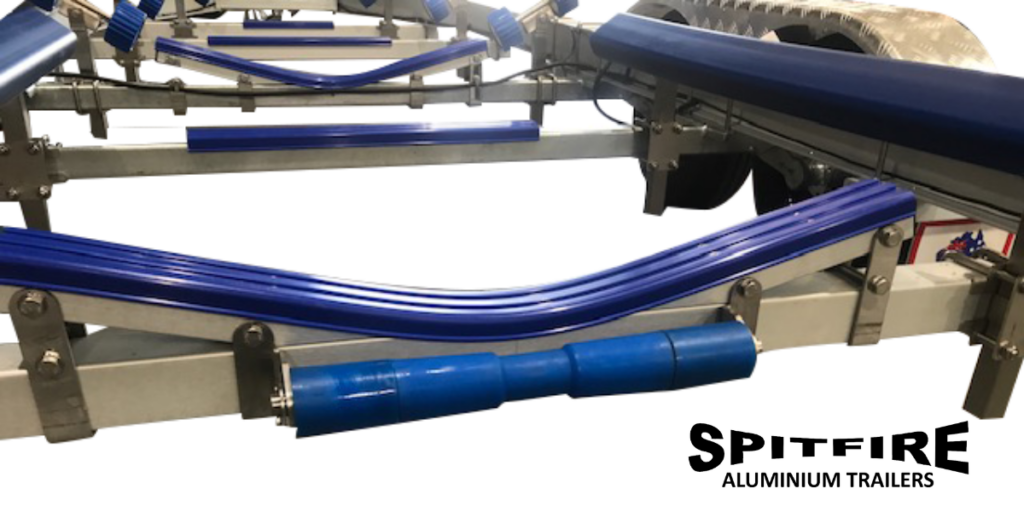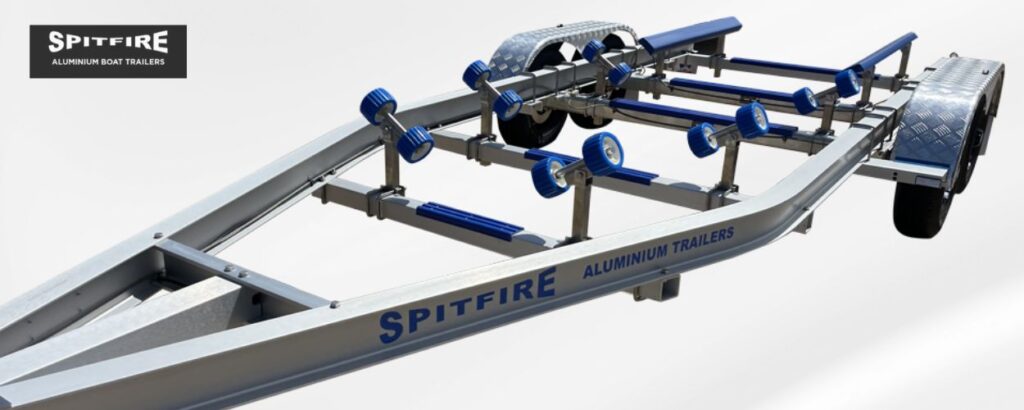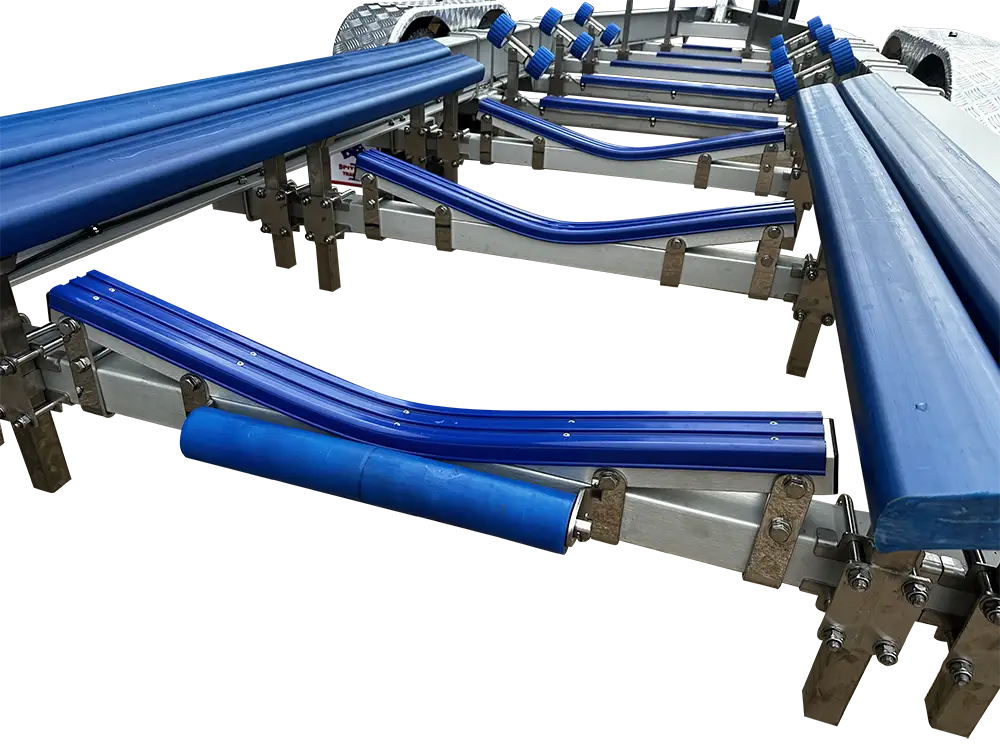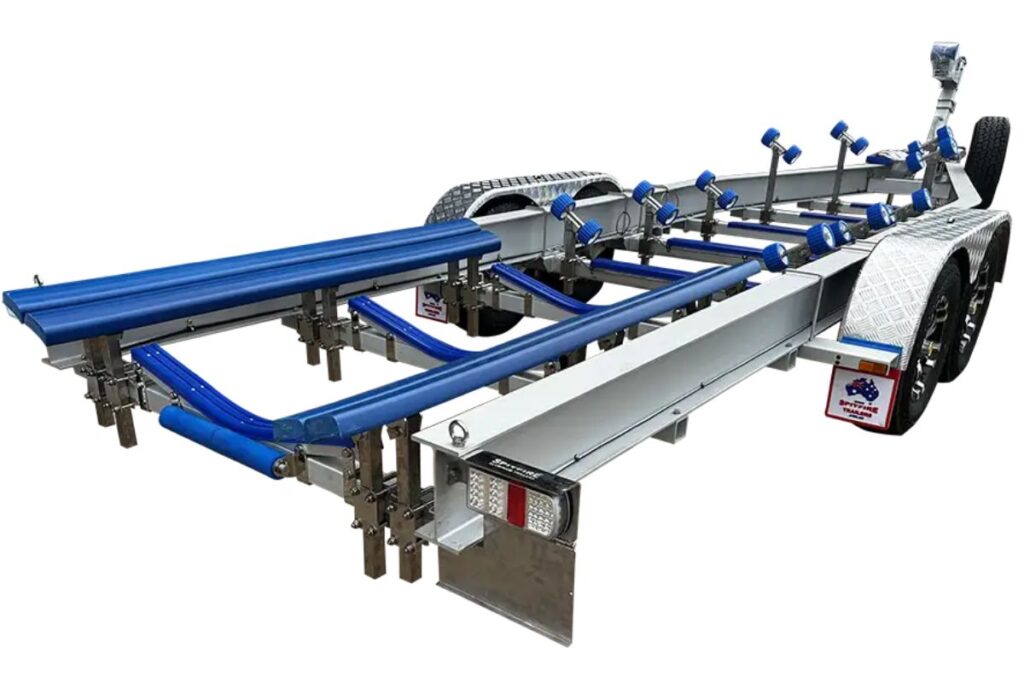Spitfire Boat Trailers
Roller vs Bunk Trailers: What is Best for Your Boat?
Did you know over 65% of Australian boat owners find it hard to pick the right trailer? Choosing between roller and bunk boat trailers can greatly affect your boating experience and how long your equipment lasts.
It’s important to pick the right boat trailer for safe transport, launching, and protecting your boat. Different trailers have their own benefits based on your boating needs, boat design, and the water conditions where you boat.
When deciding between roller and bunk trailers, consider your boat’s weight, hull design, where you launch it, and what you prefer. Knowing the main differences can help you choose the best trailer for smooth and safe boat transport.
Key Takeaways
- Boat trailer selection impacts overall maritime experience
- Roller and bunk trailers have distinct performance characteristics
- Hull design plays a critical role in trailer compatibility
- Consider your specific boating environment when choosing
- Professional consultation can provide tailored advice

Boat Trailer Support Features
Boat trailers are key for safely moving your boat on Australian roads. Knowing how trailers work helps you choose the right one for your needs.
When looking at boat trailer accessories, it’s vital to understand the complex systems for safe transport. The way weight is spread out is key to keeping the trailer stable and safe while moving.
Key Components of Modern Boat Trailers
Modern boat trailers have important parts that work together to support your boat:
- Robust frame construction
- Durable axle systems
- Specialised suspension mechanisms
- Strategic weight distribution points
Essential Trailer Design Features
Choosing the right trailer means knowing about important design features. Think about your boat’s weight, its design, and how you plan to use it. This helps pick accessories that fit your needs.
- Adjustable bunks or rollers
- Corrosion-resistant materials
- Integrated weight distribution systems
- Customizable support configurations
Roller vs Bunk Boat Trailers
Choosing between roller and bunk trailers can be tough for boat owners. Each has its own benefits for safely and efficiently moving your boat across Australian waters.
Roller trailers let boats move more freely when loading and unloading. They have many cylindrical rollers that support the boat’s hull. This makes them great for smaller boats and those with flat bottoms.
- Easierboat positioning
- Quick launch capabilities
- Better for lightweight boats
Bunk trailers, on the other hand, offer a stable base for bigger and heavier boats. They use carpeted wooden or fibreglass supports to cradle the boat’s hull. This even weight distribution and support during transport are key benefits.
- Enhanced stability for larger vessels
- Better weight distribution
- Reduced hull stress
When deciding between roller and bunk trailers, think about your boating needs. The size, weight, and use of your boat will help choose the right trailer for you.

The Advantages of Roller Trailers for Boat Transport
Roller trailers have changed the game for boat transport in Australia. They make launching and retrieving boats easier and more efficient. These trailers are a practical choice for boat owners who want smooth and reliable transport.
Roller trailers offer more than just transport. They are flexible and adaptable for different boats and terrains.
Easy Launch and Retrieval Benefits
Launching boats is smoother with roller trailers. The rollers are placed to reduce friction and make movement easier. This also lowers the risk of hull damage and allows for quick launching by one person.
Versatility Across Different Boat Types
Roller trailers are great for different boat designs. They can handle small fishing boats, medium-sized day cruisers, lightweight aluminium vessels, and recreational watercraft.
Maintenance Requirements for Roller Systems
Keeping your roller trailer in good shape is important. You need to regularly check the rollers, lubricate moving parts, ensure alignment, and clean them after saltwater use.
Knowing these benefits helps you choose the right trailer for your boat transport needs. This ensures easy launching and retrieval every time.

Bunk Trailer Benefits: Superior Support and Stability
Bunk trailers are a top choice for boat owners. They offer unmatched stability and protection. These trailers ensure your boat stays safe while moving across Australian waters.
There are many benefits to using bunk trailers. The flat support system is great for all kinds of boats. It’s perfect for bigger boats that need even weight distribution.
- Provides uniform hull support across entire boat length
- Minimises hull distortion during transport
- Reduces stress on specific boat sections
- Offers superior stability for heavier marine vessels
Your boat’s safety depends on good support. Bunk trailers give your boat a stable base. This stops it from moving too much, keeping it safe from damage.
Many boat types get better support from bunk trailers. Fibreglass, wooden, and aluminium boats all benefit. They get less damage from long trips or being stationary.
For those in Australia looking for a reliable way to move their boats, bunk trailers are a smart choice. They protect your boat and make moving it easier.
Cost Analysis: Investment and Long-term Value Comparison
Choosing the right boat trailer is a big decision. You need to think about the cost now and in the future. Knowing these costs helps you make a wise choice for your boating adventures.
Boat owners must look at more than just the price when buying a trailer. Each type of trailer has its own financial pros and cons.
Initial Purchase Considerations
The cost of a trailer can vary a lot. Here are some typical price ranges:
- Roller trailers: $1,500 – $4,000
- Bunk trailers: $2,000 – $5,500
- Custom or specialized trailers: $3,500 – $7,000
Maintenance and Replacement Costs
Long-term costs are important in your trailer cost analysis. Different trailers need different care:
Trailer Type | Annual Maintenance Cost | Expected Lifespan |
Roller Trailers | $200 – $400 | 8-12 years |
Bunk Trailers | $100 – $250 | 10-15 years |
Long-term Value Assessment
Your trailer investment is more than just the first cost. Think about durability, upkeep, and resale value. Bunk trailers might be a better choice for long-term savings because they need less maintenance and last longer.
Smart boat owners know the cheapest option isn’t always the best. Look at your boating needs carefully to find a trailer that offers the best value.
Loading and Launching Techniques for Different Trailer Types
Towing and launching boats need skill and precision. Knowing the right techniques for each trailer type makes launching smooth and safe. Whether it’s a roller or bunk trailer, each has its own loading and launching methods.
Correctly loading your boat is key for safe transport. With roller trailers, align your boat carefully for even weight. Bunk trailers need a different method, with the boat resting on supportive bunks.
- Prepare your launching area before boat launching
- Check trailer alignment with the water’s edge
- Secure all boat tie-downs before movement
- Inspect trailer wheels and bearings prior to launching
Launching techniques differ by trailer type. Roller trailers slide in and out easily, while bunk trailers offer stable support. Your method depends on the trailer design and boat type.
Trailer Type | Loading Technique | Launching Ease |
Roller Trailer | Slide-on method | Quick and smooth |
Bunk Trailer | Precise alignment | Stable but slower |
Always put safety first when towing and launching boats. Take your time, practice, and know your trailer’s features. Proper preparation prevents accidents and enhances your boating fun.
Maintenance Tips and Care Requirements
Keeping your boat trailer in top shape is key for safety and saving money. Regular checks prevent sudden breakdowns and extend your trailer’s life. This saves you cash and keeps your boat safe.
Proper care means a detailed inspection and maintenance plan. A structured routine helps spot issues early, avoiding expensive fixes.
Routine Inspection Guidelines
- Check wheel bearings for smooth rotation and proper lubrication
- Inspect tyres for wear, pressure, and alignment
- Examine brake systems and electrical connections
- Look for signs of rust or structural damage
Common Wear Points and Solutions
Wear Point | Potential Issue | Recommended Solution |
Rollers/Bunks | Cracking or wear | Replace every 3-5 years |
Winch Strap | Fraying or weakness | Annual replacement |
Suspension | Spring tension loss | Professional inspection yearly |
Seasonal Maintenance Schedule
- Spring: Deep clean and lubrication
- Summer: Regular rinse in saltwater
- Autumn: Detailed technical check
- Winter: Prepare for storage and apply protective coating
Regular maintenance is an investment in your boat trailer’s health. It cuts down repair costs and ensures safe travel on Australian roads.
Why Choose Spitfire Boat Trailers' Hybrid Solutions

Spitfire Boat Trailers offer something special with our hybrid solutions. We’ve mixed the best parts of roller and bunk trailers. This gives you unmatched flexibility and performance.
Our hybrid design fixes old problems with roller and bunk trailers. We know each boat is different. So, we’ve made a trailer that fits your boating needs perfectly.
- Seamless integration of roller and bunk technologies
- Enhanced boat hull protection
- Superior weight distribution
- Improved loading and unloading experience
Our hybrid system ends the roller vs bunk debate. It offers many contact points for better stability and less damage to your boat. You’ll enjoy smoother launches, easier transport, and more confidence on every trip.
Feature | Spitfire Hybrid Advantage |
Stability | Advanced multi-point support system |
Hull Protection | Customized cushioning and weight distribution |
Versatility | Compatible with multiple boat types and sizes |
Choose Spitfire Boat Trailers for a trailering experience that changes the game. It’s designed for the highest standards of Australian boating enthusiasts.
Conclusion
Finding the right boat trailer can be tough, but knowing the difference between roller and bunk trailers is key for Aussie boat owners. Your needs will decide which trailer is best for your boat.
Roller trailers are great for easy launching and are versatile. Bunk trailers, on the other hand, offer better stability and support for certain boats. Spitfire Boat Trailers has created hybrid solutions to meet the varied needs of boat owners.
Think about your boat’s size, weight, hull design, and where you’ll use it. Also, consider the upkeep, cost, and value over time of different trailers. Talking to marine experts can help you make a choice that fits your boating lifestyle.
Your ideal boat trailer is out there, combining performance, durability, and ease of use. Spend time researching and comparing to find a trailer that will keep your boat safe and improve your boating adventures in Australia’s beautiful waters.
FAQ
Q: What’s the main difference between roller and bunk trailers?
A: Roller trailers use cylindrical rollers to support your boat. This makes launching and retrieval easier. Bunk trailers, on the other hand, use flat pads to cradle the boat’s hull. They provide more stable and even weight distribution.
Q: Which trailer type is better for saltwater use?
A: Bunk trailers are better for saltwater because they have fewer parts that can corrode. Stainless steel or galvanised bunks are very resistant to saltwater damage. Roller mechanisms are more prone to corrosion.
Q: How do I choose between a roller and bunk trailer for my boat?
A: Think about your boat’s size, weight, hull type, and launching conditions. Smaller boats with flat hulls often do well with roller trailers. Larger or heavier boats usually need the stability of bunk trailers.
Q: Are roller trailers more expensive than bunk trailers?
A: Roller trailers usually cost more upfront because of their complex mechanism. But, the total cost depends on features, materials, and your boat’s needs.
Q: How often should I maintain my boat trailer?
A: Check your trailer before and after each use, and do a full check-up annually. Roller trailers need more frequent maintenance because of their moving parts. Bunk trailers are generally easier to maintain.
Q: Can I use a roller trailer for a fibreglass boat?
A: You can, but bunk trailers are usually better for fibreglass boats. They offer more even support and reduce hull damage risks during transport and storage.
Q: What safety precautions should I take when using a boat trailer?
A: Always check tire pressure, ensure the boat is securely fastened, and verify brake and light connections. Make sure the trailer matches your boat’s weight and size before towing.
Q: Do trailers work differently on various boat ramps?
A: Yes, they do. Roller trailers work better on steep ramps, while bunk trailers are best on gradual slopes. Choose based on your local water conditions.
Q: How long do boat trailers typically last?
A: With good care, a quality trailer can last 10-15 years. Bunk trailers might last a bit longer because they have fewer moving parts than roller trailers.
Q: Can I convert between roller and bunk trailer systems?
A: Changing between them is hard and expensive. Some hybrid trailers offer interchangeable parts, but a full change is usually not worth it. It’s best to pick the right one from the start.

